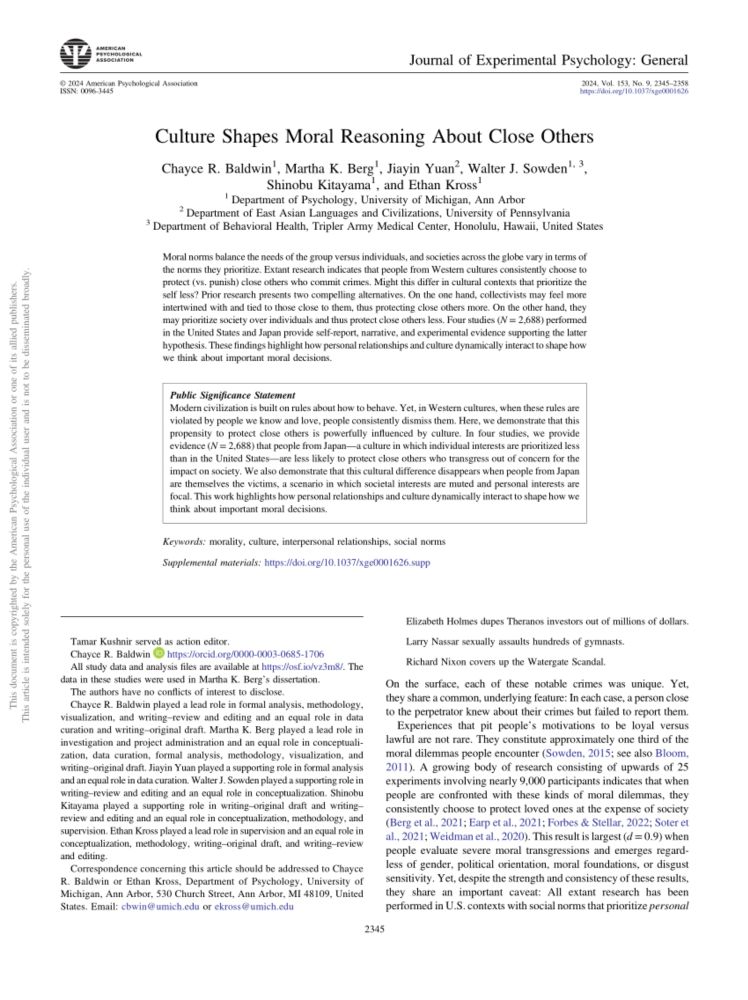Chayce Baldwin
@chaycebaldwin.bsky.social
PhD candidate at University of Michigan studying the self and emotion in everyday life using culture, language, and anything else I can. chaycebaldwin.com | r4psych.org
3. 65% of these combinations, including many of the most effective ones, manifested as a blend of strategies that have not often been studied together (e.g., using rituals, exercising, and cognitive reappraisal).
February 18, 2025 at 2:02 PM
3. 65% of these combinations, including many of the most effective ones, manifested as a blend of strategies that have not often been studied together (e.g., using rituals, exercising, and cognitive reappraisal).
2. Remarkably, people were able to effectively regulate with a wide range of strategies used together: we found that the qualities of strategy combinations, regardless of the individual strategies used, predicted emotion regulation outcomes.
February 18, 2025 at 2:02 PM
2. Remarkably, people were able to effectively regulate with a wide range of strategies used together: we found that the qualities of strategy combinations, regardless of the individual strategies used, predicted emotion regulation outcomes.
Here are three take-homes:
1. We documented the diverse combinations of strategies people organically use in daily life. And they *are* diverse: 74% of the more than 5,000 strategy combinations reported in our study were only used by one person, one time.
1. We documented the diverse combinations of strategies people organically use in daily life. And they *are* diverse: 74% of the more than 5,000 strategy combinations reported in our study were only used by one person, one time.
February 18, 2025 at 2:02 PM
Here are three take-homes:
1. We documented the diverse combinations of strategies people organically use in daily life. And they *are* diverse: 74% of the more than 5,000 strategy combinations reported in our study were only used by one person, one time.
1. We documented the diverse combinations of strategies people organically use in daily life. And they *are* diverse: 74% of the more than 5,000 strategy combinations reported in our study were only used by one person, one time.
Your wish is my command!
September 24, 2024 at 8:03 PM
Your wish is my command!
Here’s a non-paywalled link: www.researchgate.net/publication/...

(PDF) Culture Shapes Moral Reasoning About Close Others
PDF | Moral norms balance the needs of the group versus individuals, and societies across the globe vary in terms of the norms they prioritize. Extant... | Find, read and cite all the research you nee...
www.researchgate.net
September 24, 2024 at 2:21 PM
Here’s a non-paywalled link: www.researchgate.net/publication/...
In the paper, we discuss the implications of these findings for understanding how close relationships play into moral judgment, especially in cultures where individuals must balance competing obligations to their ingroups and the larger society.
September 24, 2024 at 2:20 PM
In the paper, we discuss the implications of these findings for understanding how close relationships play into moral judgment, especially in cultures where individuals must balance competing obligations to their ingroups and the larger society.
Here’s the tl;dr:
Across 4 experiments and more than 2500 people, we show that Japanese have a harder time resolving moral dilemmas about close others than Americans, but ultimately choose to consistently prioritize societal over personal or interpersonal interests.
Across 4 experiments and more than 2500 people, we show that Japanese have a harder time resolving moral dilemmas about close others than Americans, but ultimately choose to consistently prioritize societal over personal or interpersonal interests.
September 24, 2024 at 2:20 PM
Here’s the tl;dr:
Across 4 experiments and more than 2500 people, we show that Japanese have a harder time resolving moral dilemmas about close others than Americans, but ultimately choose to consistently prioritize societal over personal or interpersonal interests.
Across 4 experiments and more than 2500 people, we show that Japanese have a harder time resolving moral dilemmas about close others than Americans, but ultimately choose to consistently prioritize societal over personal or interpersonal interests.
As a student in the department, +1 to this--there seems to be various beliefs/misconceptions about open science across the department.
December 23, 2023 at 8:47 PM
As a student in the department, +1 to this--there seems to be various beliefs/misconceptions about open science across the department.
That's sad! I wonder if it's partially due to students sometimes being encouraged *not* to take extra classes that aren't required, especially as they move into their dissertation years.
December 23, 2023 at 8:44 PM
That's sad! I wonder if it's partially due to students sometimes being encouraged *not* to take extra classes that aren't required, especially as they move into their dissertation years.
An approach like this--scaling up to much more complex and flexible models--might be what is needed to overcome our inability to prospectively predict objective outcomes very well, an issue we discuss in this preprint:
osf.io/preprints/ps...
osf.io/preprints/ps...
OSF
osf.io
December 21, 2023 at 1:03 PM
An approach like this--scaling up to much more complex and flexible models--might be what is needed to overcome our inability to prospectively predict objective outcomes very well, an issue we discuss in this preprint:
osf.io/preprints/ps...
osf.io/preprints/ps...

